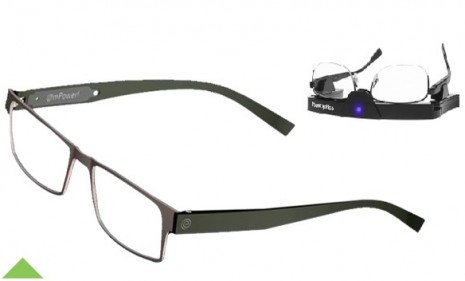The electronic eyeglasses that could replace bifocals
PixelOptics plans to release a new line of high-tech specs that toggle between prescriptions with a mere tilt of your head

A free daily email with the biggest news stories of the day – and the best features from TheWeek.com
You are now subscribed
Your newsletter sign-up was successful
Bespectacled Americans who rely on bifocal or progressive lenses may soon get a new view on life. This June, PixelOptics of Roanoke, Va., plans to introduce a line of electronic eyeglasses, called emPower, that allows wearers to effortlessly switch between prescriptions for reading and distance viewing. Here, a guide to the new technology:
How do these glasses work?
Their parts are reminiscent of those found in iPods, says Anne Eisenberg in The New York Times. The lenses "feature a thin layer of liquid crystal sandwiched between two layers of plastic," says Catherine Clifford at CNNMoney. When zapped with a jolt of electricity, the crystals change their alignment to affect how the lenses reflect light. Wearers can simply tilt their head downward or manually press the frames to activate that change. The toggling function will work for two to three days after each six- to eight-hour battery charge.
The Week
Escape your echo chamber. Get the facts behind the news, plus analysis from multiple perspectives.

Sign up for The Week's Free Newsletters
From our morning news briefing to a weekly Good News Newsletter, get the best of The Week delivered directly to your inbox.
From our morning news briefing to a weekly Good News Newsletter, get the best of The Week delivered directly to your inbox.
Why is this necessary?
The reading portion of traditional bifocal lenses "blur objects more than an arm’s length away," says Eisenberg in The New York Times, meaning that they can distort the view when looking down at the ground, stepping off a curb, climbing a staircase, or even swinging at a golf ball. In 2010, more than 20 million sets of progressive lenses and more than 16 million bifocals were sold in the U.S.
How long have these high-tech specs been in development?
The process took about 12 years and involved some 275 patents.
A free daily email with the biggest news stories of the day – and the best features from TheWeek.com
Where will they be available?
The emPower glasses "will be distributed through a network of local eyewear professionals," according to Clifford at CNNMoney. The company will roll them out regionally, starting in Virginia and North Carolina, this summer.
How much will they cost?
Considerably more than a basic pair of glasses. The individual retailers will set their own markups, but Blum says the price tag will be between $1,000 and $1,250 a pair. That includes the frames, lenses, coatings, and charger. Still, even at that price, these glasses "can be a convenient alternative for those with qualms over corrective surgery with lasers," says Paul Eng at The Consumerist.
Sources: CNNMoney, The Consumerist, New York Times, Orlando Sentinel
-
 Health insurance: Premiums soar as ACA subsidies end
Health insurance: Premiums soar as ACA subsidies endFeature 1.4 million people have dropped coverage
-
 Anthropic: AI triggers the ‘SaaSpocalypse’
Anthropic: AI triggers the ‘SaaSpocalypse’Feature A grim reaper for software services?
-
 NIH director Bhattacharya tapped as acting CDC head
NIH director Bhattacharya tapped as acting CDC headSpeed Read Jay Bhattacharya, a critic of the CDC’s Covid-19 response, will now lead the Centers for Disease Control and Prevention